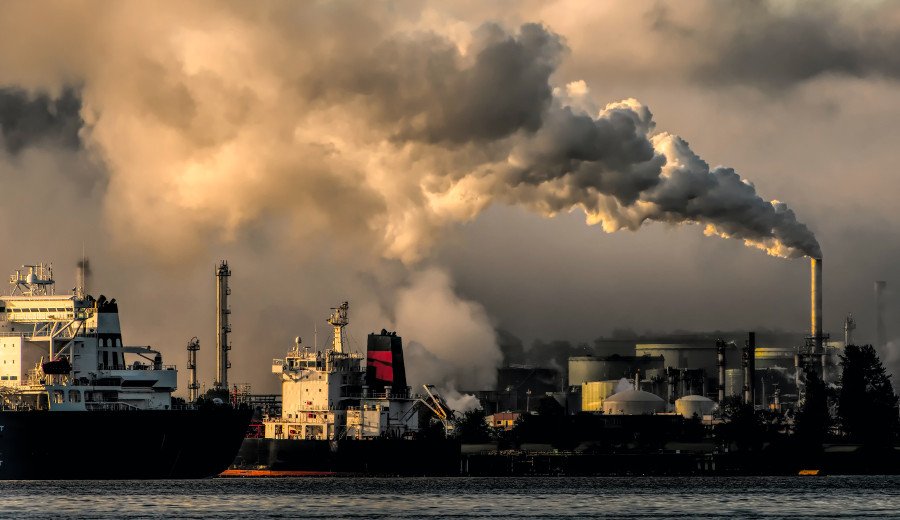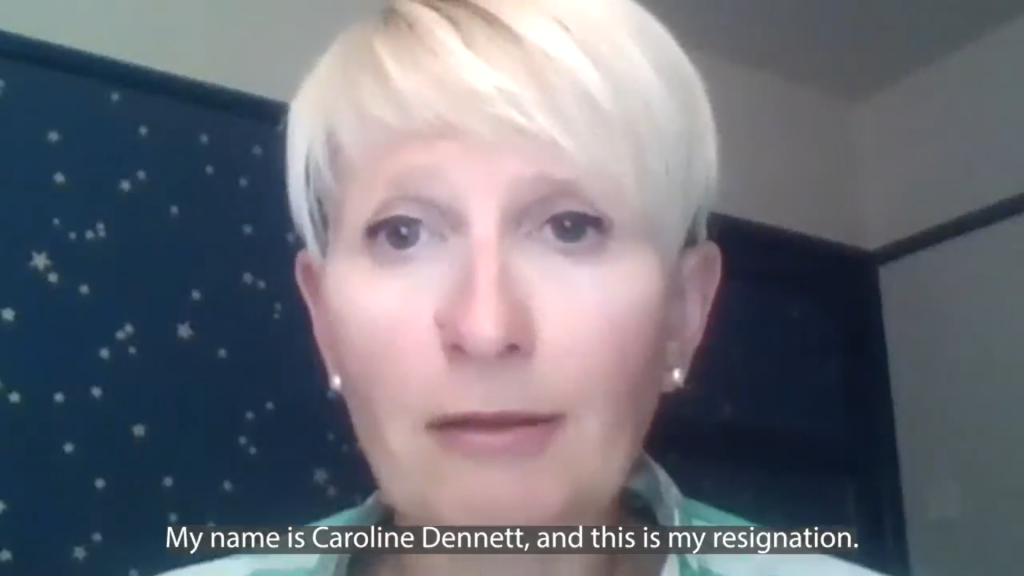“There is no net zero plan”: Caroline Dennett on quitting Shell over climate double talk

When Caroline Dennett released a video of her resignation as a consultant for Shell, it quickly went viral. The former safety consultant for the oil and gas giant created the video and emailed the company’s executives and over a thousand members of staff to draw attention to the company’s continuing extraction projects and use of fossil fuels, despite pledging a commitment to net zero.
Here Caroline tells us what is really happening behind the scenes at Shell compared to what they say they are doing, and why she is optimistic about people demanding change.
NADJA: What sort of work did you do for Shell?
Caroline Dennett: I’d been running my own research company for about 18 months when a management consultancy put me in touch with Shell. They wanted someone to write a survey for them – this was in the aftermath of the Deepwater Horizon oil spill, a disaster that killed 11 people after millions of barrels of oil were pumped into the Gulf of Mexico [by BP]. I think Shell really took a serious look at themselves and thought, “that could have been us”.
They wanted to understand what was really happening on the frontline and what conditions could make that happen again. We built a survey with some of the technical people and engineers to understand what could go wrong, not just from a performance and systems point of view, but from a human point of view.
NADJA: What was it like to work with Shell?
CD: Shell absolutely loved the hard-hitting nature of it, so I ended up working with them indefinitely running the surveys on an ad hoc basis. In fairness they did take note of the results. There was a lot of open feedback in the survey so it was very rich in terms of people’s ideas.
I interfaced with about 20,000 employees over the last 10 years, and it was quite hard to turn my back on in some respects, because I think the health, safety and environment officers saw me as an ally. It took me quite a long time to jump because I genuinely believed there was value in the work I was doing, in protecting people from harm and protecting the environment from leaks and spills.
NADJA: What was the turning point?
CD: It was gradual. In the first three or four years there was a real appetite for change, particularly for process safety, making sure there were no explosions and spills.
I’d been involved in green politics for quite a number of years. Then three years ago I attended a talk by Extinction Rebellion covering all the science around ecological catastrophe, and it made me realise that I knew literally nothing about climate change. Over time the distance between my values and Shell’s actual values – not the ones they’ve written on paper because they look good – grew bigger.
Last summer, we were asked to work on a new project with Nigerian operations. Over the years we have done lots of work there, but this was different. They asked me to rewrite one of the surveys to make it more applicable to new construction projects. I thought, “why would we do that if there are only one or two?” But they said there are going to be seven or eight of these new extraction and exploration projects down the line. Even in the Niger Delta, which is so polluted and has been damaged beyond repair, they’re still doing this. I realised they have no intention of winding this down, and I decided this would be the last project I worked on for Shell.
NADJA: What is Shell’s environmental policy?
CD: They’ve got this safety programme called Goal Zero, around no harm and no leaks. That seems quite admirable, and they probably do work reasonably hard on an individual person and asset level, but what’s the point in having that safety ambition if you’re damaging the planet on such a scale that we won’t have a safe future?
I worked on their new energies portfolio and they are just buying up existing technology and organisations so they can greenwash their portfolio and tick the box that says they are investing in new energies. Buying up an existing successful German company that makes batteries for solar panels is not investment, it’s acquisition.
NADJA: Were you expecting your resignation video to go viral?
CD: I think the time was right. People are really hacked off, and I think I tapped into a feeling that there is a lot of injustice around this. These corporations are bad actors and people know that.
There were some comments like “those clothes and makeup have come from oil money”, but I almost never had to reply because others would pile on and say this is nonsense. However we need to hear from people who’ve been in the industry for 30 or 40 years and who have given their life to it. I often say to people in the climate movement that when they think of the likes of Shell, they think of people sitting at HQ and in the marketing departments, they don’t think of your typical Shell oil and gas worker, who may be a person of colour, working in an environment that’s really dangerous, putting their neck on the line every single day so that we can turn the lights on in the West.
More than 80% of Nigerian homes don’t have a clean cooking facility. They produce tonnes of gas and oil but the vast majority of people in Nigeria never see the benefit of that because it gets shipped elsewhere around the world. We need to think about those people and that fair transition. People made those comments because they felt blame. But they’re not to blame – the corporation is.
NADJA: What did you want to achieve by speaking publicly?
CD: I wanted to grab the attention of the chief executive board and help them understand that what they talk about on safety in operations doesn’t equate to the safety of the world. Could they look in the mirror and say to themselves, “This continued oil and gas extraction is the right thing to do?”
I also wanted to start a conversation on the frontline, because nobody’s talking about climate change in the operational end. Less than 2% of all open feedback we’ve ever had mentions climate change, and I’m talking somewhere in the region of a million words of open feedback in the last 10 years.

NADJA: What would you say to workers at oil and gas companies who are not decision-makers?
CD: For those people who can walk away, who have the luxury of choice like I had, get out if you can. That will put the pressure on internally. This has been happening – retention is a big problem, certainly at Shell and probably across the industry. We’ve seen in survey results that many skilled people have left, and quite a few people I worked with in the past have left the industry entirely.
If you’re going to stay or if you have to stay because you don’t have a choice, ask to see the plan. Ask for that plan to be as deeply embedded in the organisation as their safety performances, and for it be tracked and updated. Because it isn’t real, they don’t actually have a plan.
In the media response they gave to my resignation they said they have targets and thousands of people working on renewables, and in the same piece said they will continue to extract fossil fuels for decades to come. They can’t get to net zero doing what they’re doing now. It is not possible, by anyone’s telling, to get to real net zero by planting trees when you’re starting to open up new fields and plan for new exploration licences.
The International Energy Agency are telling the fossil fuel industry that it’s not possible and they have to cease all new exploration projects, but the people at the top don’t care because they feel they are immune to climate change, and they probably are because they can ensure they are living in places that are going to be the least affected.
As an organisation they don’t care because they don’t see how they can make a profit from renewables. There is some profit to be made from infrastructure building, but if wind and solar and tidal are free sources of energy, how do they monetise that? They love fossil fuel energy because it’s so expensive to produce and it justifies their ends, so they can get subsidies and tax breaks.
NADJA: What are you focusing your efforts on now?
CD: There is something on the horizon that is going to be huge, to do with a new renewable energy. We’ve set up a community interest company and have some really good creative people on board, and we’re about to start talking to some tech and engineering people. I think that in about two months it will be big stuff.
NADJA: Are you optimistic about the future?
CD: I flip flop between hope and despair on a daily basis, but since I quit Shell I’ve realised that it’s not just the radical movement like Extinction Rebellion, there is a whole world of professional networks and people who are working in green tech. Some of that will be greenwashed or not enough, but many professionals have turned their skills to finding solutions.
Until six weeks ago I had accepted that humans won’t be around in the next 60 or 70 years, maybe even sooner. But recently, having seen how many people are working on this, and the project I’m working on now, I have hope.
The weekend before I quit Shell was just after the election in Australia and that gave me hope too. People who are the most affected by the climate crisis brought about this change, they convinced the Labor Party to adopt a climate change policy and that was the only way they were going to win. Maybe there’ll be a ripple effect. People want change and we just need to turn that into a groundswell and not let the tide turn. Now is the time for people to make their voices count and take action.
Leila Hawkins


5 thoughts on ““There is no net zero plan”: Caroline Dennett on quitting Shell over climate double talk”